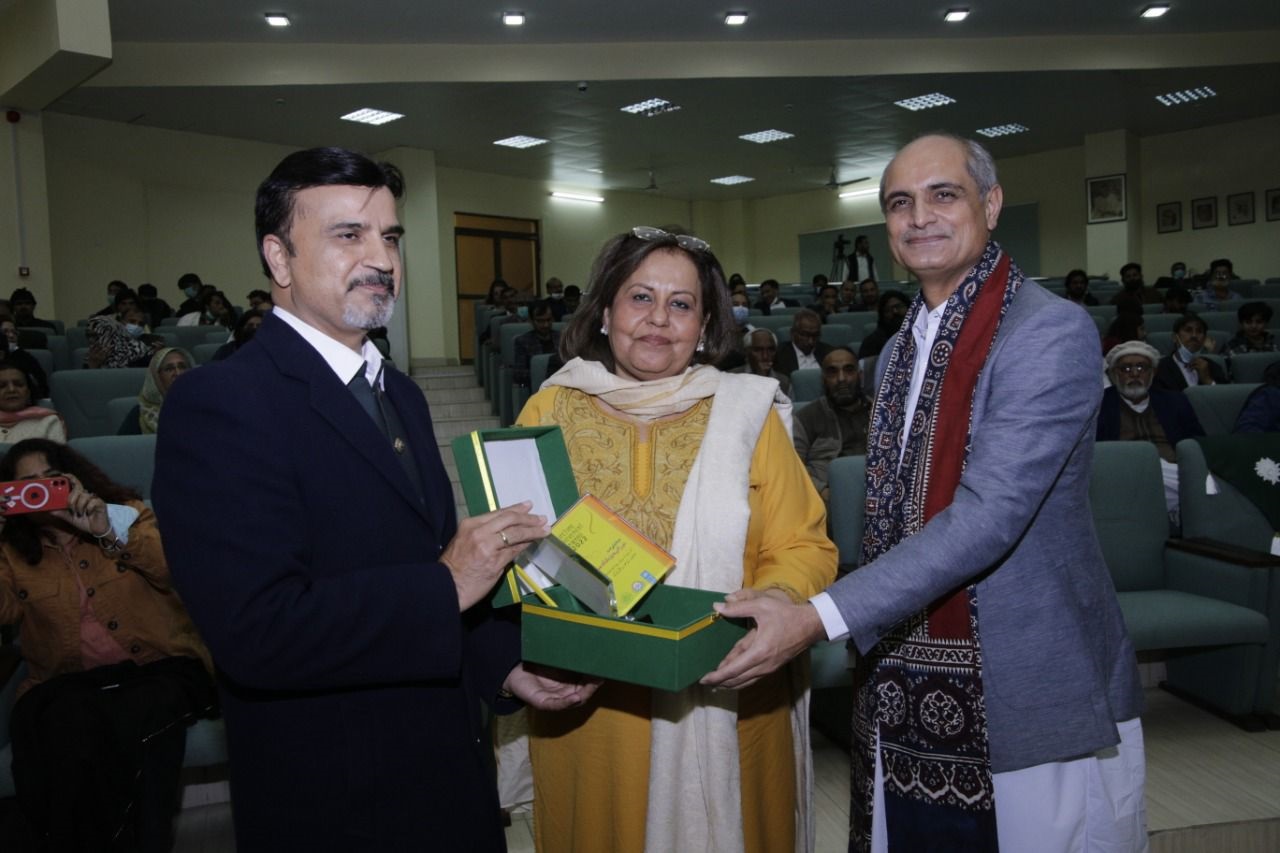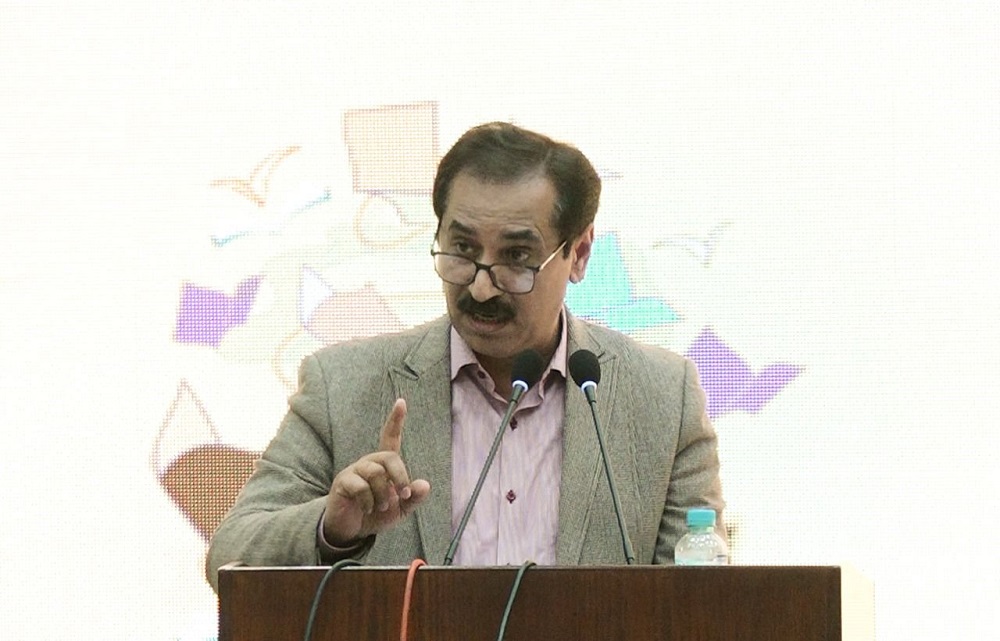Written by: Haroon Shuaib
Posted on: February 23, 2022 |  | 中文
| 中文
Dr. Manzoor Veesrio, Ghazala Saifi, Dr. Yousuf Khushk, Knut Ostoby, Resident Rep of UNDP and Munawar Hasan launching Veesrio's book 'Pakistani Zebanen aur Bolian'
According to anthropologists, more than 7,000 languages are spoken across the globe. More than 40 percent of these languages are endangered and on the verge of going extinct. Globalization and digital era have further endangered the future of many of these languages. Only less than a hundred languages are used in the digital world. Most of the communication on the internet is in English, Chinese Mandarin, Spanish, Arabic, Portuguese, Indonesian, Malayan, Japanese, Russian and German. There is a real danger that with people’s linguistic abilities converging to fewer widely spoken languages, growing reliance on digital communication, globalization of primary and higher education curricula, unbridled urbanization, regional and colloquial languages are fading away. Unfortunately, many cultures, customs, and civilizational legacies are also waning.
Not many realize that there are somewhere between 70 to 80 languages spoken in Pakistan. Urdu is the national language, while Urdu and English are the two official languages. The most spoken primary languages are Punjabi, Pushto, Sindhi, Saraiki, Urdu and Balochi. Besides these, there are several regional languages that are spoken by linguistic minorities; these include Kashmiri, Hindko, Pothohari, Brahui, Thari, Shina, Balti, Khowar, Dhatki, Haryanvi, Marwari, Mewati, Wakhi and Burushski, to name a few. The number of people speaking these languages range from tens of thousands to a few hundreds, and, unfortunately, a few are highly endangered and may soon have no speakers at all.
Indus Cultural Forum is a civil society not-for-profit organization, which is working to promote the values of cultural diversity, pluralism, harmony and social inclusion by using various forms of artistic and cultural expressions representing Indus Valley Civilization and its people. Indus Cultural Forum collaborates with organizations and individuals striving for the promotion of a culturally plural and diverse society. Its aim is to educate society, particularly women, children and youth in all aspects of the Indus Valley culture and organize events and activities like literature festivals, folk music, art promotion and cultural dialogues that help promote positive and rational growth of society and stimulate culture of tolerance and mutual respect.
For the last few years, Indus Cultural Forum has been holding an annual Pakistan Mother Languages Festival. This year, Indus Cultural Forum, in collaboration with Pakistan Academy of Letters and United Nations Development Program (UNDP), arranged a 3-day mother languages festival at Pakistan Academy of Letters. It was planned to coincide with the International Mother Language Day that is celebrated across the world on 21 February. To promote awareness of linguistic and cultural diversity and multilingualism, UNESCO declared in 1999 that February 21 would be celebrated as the International Mother Language Day every year. This year, other partners of Indus Cultural Forum for celebrating the Mother Languages Festival included Culture Departments of Sindh and Balochistan, Forum for Languages Initiative, ECO Science Foundation, SAMAR, Hazargi Academy and others. The event was held at Pakistan Academy of Letters (PAL) in Islamabad.
The opening ceremony was held on the evening of February 18, and attended by culture and literature enthusiasts, intellectuals, writers, academics and young people from across Pakistan. Supporters and volunteers associated with Indus Cultural Forum team and volunteers were also present in large numbers.

Legendary Sindhi and Urdu writer Noor ul Huda Shah receiving her Lifetime Achievement Award from Yousuf Khushk (Left) and Munawar Hassan
On this occasion, a book by Dr. Manzoor Veesrio was also launched. The ceremony was followed by an award ceremony to recognize the achievements of several literary legends including Noor-ul-Huda Shah, Zahida Hina, Sheeraz Tahir, Darwesh Durrani, Ghani Parwaz, Parveen Malik, Dr. Nasrullah Nasir, Asif Saqib, Gul Bangulzai and Hassan Hasrat. Speaking at the opening ceremony of the festival, Parliamentary Secretary for Cultural Affairs, Ghazala Saifi said, ‘Pakistan’s national language, Urdu, keeps us all connected to one another but the mother languages form our national identity and writers who produce literature using them must be appreciated. It is important to provide voices to those who are not heard, and forums such as the one provided by Indus Cultural Forum are very important steps in that direction.’
The highlight of the festival was a documentary ‘Pakistan: Places, Faces, Voices’ made by UNDP featuring 22 Pakistani languages. UNDP Resident Representative Knut Ostoby said, ‘Building local and regional networks for cultural preservation and promotion of diversity are essential ingredients to create a harmonized society.’ He added ‘Pakistan is a diverse land filled with art loving people and it is important that its diversity is not only saved but also promoted. Our documentary titled "Pakistan: Places, Faces, Voices" beautifully captures the richness and diversity of the landscape that this country is blessed with, starting from the splendid peaks of the North to the deserts and sea of the South. Featuring over 22 local languages, the idea was to bring to surface the daily problems faced by these communities, while they speak in their local languages in their own settings.’
Delving on the reasons for the challenges regional languages are facing, PAL Chairman, Yousuf Khush, underlined the need for immediate measures to save languages. ‘Several economic and social motivations result in migration which ultimately leads to languages dying out,’ he stated.
Prominent writer Nasir Abbas Nayar in his keynote speech said languages are not competitive entities but coexisting communication sources and they tie us together to stabilize society and encourage peace. Indus Cultural Forum Chairperson Munawar Hassan said that despite the fact that Pakistan is home to over 70 languages, the beauty of these languages is hardly known at the national level. ‘The festival is a humble contribution to offer respect for linguistic diversity. He said the festival has grown in its scope and scale over last seven years, and every year more and more variety are added to the festival. This year we will launch over 60 books in various genres, including over 20 books of poetry from 13 languages, over 10 novels in different languages and over 10 books of short stories,’ he said. The opening ceremony was hosted by the prominent TV anchor, broadcaster and a volunteer associated with Indus Cultural Forum, Tauseeq Haider.

The keynote speaker of the festival, famous Urdu critic Dr. Nasir Abbas Nayyar speaking at the opening ceremony
Over the next two days, other sessions of the festival included launching of eight novels in different languages, launching of books of poetry in 13 languages, discussion sessions with young poets from various languages, session on dictionaries and adaptability of languages, feminist literature in mother languages. Various stalls of books were arranged to showcase works in different languages. A planetarium was also arranged for kids. On the last day of the festival, two sessions were organized, both focused on highlighting the need for state and society to work together for promotion and protection of the endangered languages, and also on the role of literature festivals in galvanizing literary activism and promoting the culture of reading in the country. Various stalls of books were arranged to showcase works in different languages. The festival culminated with a multilingual concert.
You may also like: